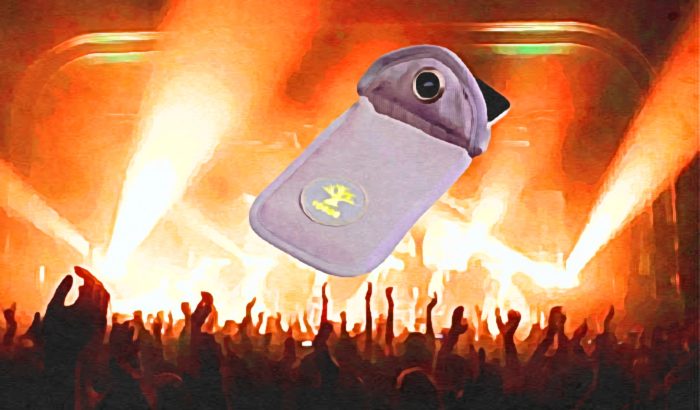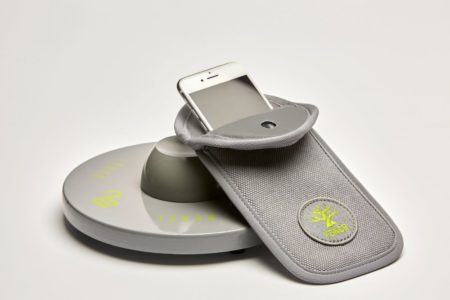
Whether you like them or not, phone pouches may be the future of concerts
For artists fed up with performing to an audience of iPhone cameras, Silicon Valley has offered a solution in Yondr. The San Francisco-based company allows performers to create phone-free spaces at their shows.
To witness their technology in action, we checked out a recent David Cross performance at the Sinclair in Cambridge. Event-goers waited in line to show their ticket, then entered a separate queue to place their phones into Yondr Pouches, gray fabric sleeves a little larger than a standard smartphone. Venue staffers locked the pouches, but the audience kept their phones with them through the show.
In order to unlock their phones, they had to leave the space and ask a staff member to open the pouch. Staff explained the procedure as they locked the pouches, though the venue’s website had already notified event-goers of the show’s phone-free policy when tickets first went on sale.
Sha, who attended the Cross show, said it was her first time using a Yondr pouch. She described the experience as “disorienting,” but acknowledged the benefits of a phone-free environment.
“Everybody was there,” she said. “They were engaged, they were in the show.”
Sha added that she understood the appeal of Yondr to David Cross, who likely did not want his content leaked online. (Ed note: Cross didn’t want any press coverage either, which is also understandable.)
“He was going to test his material on the audience,” Sha added. “It felt weird not to have my phone, but I could see why he did it.”
According to company materials, Yondr provides “a haven to engage with what you’re doing and who you’re doing it with.” Founded in 2014, the company manufactures magnetically-locked phone pouches and accompanying devices to unlock them.
The promise of a phone-free “haven” attracts a wide range of clients. To date, Yondr pouches have been used at schools, concerts, comedy shows, courthouses, and private events. Celebrities like Jack White are loyal partners of Yondr and boosters of the brand’s popularity.
“We think you’ll enjoy looking up from your gadgets for a little while and experience music and our shared love of it in person,” White’s team announced when they first implemented Yondr in 2018.
Six comedians and musicians endorse Yondr on its website and more than 15 celebrities are currently partners with the company. Earlier this year, the NY Post noted that Boston was the first city to see comedian Chris Rock implement Yondr pouches during his tour (the show came just days after the Will Smith Oscars slap).
Though they have been in use for a while, this year Yondr started showing up in even more places, including in Boston. And as the neoprene sleeves have increasingly appeared across the country, major news outlets have taken note. “Putting smartphones in sealed bags may seem like a dramatic action to take in what is now the third decade of the internet’s existence, but it’s a concession that some artists believe will bring people together,” the LA Times observed in March.

Crowd reaction
Reactions to Yondr on social media have taken on a far less measured tone. One Twitter user fresh out of Jack White’s 2019 show at the House of Blues called Yondr Pouches a “neoprene ‘fuck you’ bag for your phone.” Over on TikTok, multiple videos teach high schoolers how to open school-sanctioned Yondr pouches by banging them on a table.
Locally, Torin Harris, who regularly attends local concerts, said she dislikes the idea of phone bans.
“In theory it sounds cool because you’re in the moment and all that stuff, but I just think it’s unsafe,” Harris said, offering a recent experience where they attended a concert at Roadrunner where two people fainted. She said banning phones makes her “nervous” due to crowd control issues, since event-goers are unable to contact people on the outside for help during an emergency.
After 10 people died of compression asphyxia at a Travis Scott concert in Houston last fall, crowd surges received massive amounts of legal and media attention. Performers now regularly pause shows to ensure the audience’s safety, but worldwide, the problem persists.
Earlier this month, more than two-dozen people fainted at an NCT-17 concert in Indonesia after the crowd surged towards the stage; before that, during a June show in Toronto, Phoebe Bridgers stopped playing more than five times so that members of the audience could receive medical attention.
Karin Willison is the founder of the Ability Toolbox, a self-help community for people with disabilities. Willison, who enjoys attending Broadway shows, said banning phones at concerts creates additional safety concerns for the disabled community.
“It’s punishing everyone for a few people’s bad behavior, and it’s putting vulnerable people at risk,” she said.
According to Willison, phones play an important role in accessibility. As one example, people with diabetes may use them to check their blood sugar, while parents of children with disabilities rely on phones to stay in contact with their children when they go out. Willison said keeping these technologies available is a priority for the entire disabled community.
“I think there’s a range of feelings about whether the cases should exist at all, but as far as there being exceptions for people who need to have access to their phone, that’s pretty universally agreed upon,” she said.
Dan Harris works at the Boston Center for Independent Living, a nonprofit serving the disabled community. Harris acknowledged the benefits of a phone-free environment for performers but said it could exacerbate misconceptions surrounding the disabled community.
“There’s probably some stigma or some ideas around people with disabilities that they don’t want to be out late or don’t want to go to shows, but I’m here to tell you that that’s wrong,” he said. “We enjoy things just like everybody else, but we want to enjoy them in a way that is optimal to us.”
Yondr’s website does not mention any exemptions from phone bans for people with disabilities. The company did not respond to a request for comment.
For Sha, not having access to her phone didn’t seem to create a safety threat, a feeling she attributed to the Sinclair staff.
“I think with the amount of security that they had inside, if you did have a medical emergency you could flag somebody down and they would be very attentive,” she said.
Joe DeStefano, who attended the David Cross show with Sha, acknowledged safety was a “legitimate issue,” but said that it “didn’t really cross [his] mind.” He said that if an emergency happened, event-goers could easily run to the front of the venue and have staff open the pouches.
For Willison, though, banning phones in concerts poses safety concerns regardless of the venue’s capabilities. She said that taking people’s devices is unfeasible irrespective of whether someone has a disability or not.
“The best usher in the world isn’t going to be sitting there unlocking people’s phones if the building’s on fire,” she said.
@liamg516 #greenscreen is iphone free pouches thr future of concerts #concerts #yondr #smartphones ♬ Aesthetic – Tollan Kim
Phone check
A bouncer from a local large-sized venue said Yondr could alleviate some of the burdens that security staff members face when artists request that the audience not use their phones during a show.
“I have to kick people out of a show they paid a lot of money for just for using the device that they use for hours every day,” they said.
They added that Yondr Pouches “would make it a lot easier” to enforce artists’ phone policies since the phones would already be inaccessible, and security staff wouldn’t have to remind people to keep their phones in their pockets.
The security person, who asked to remain anonymous, anticipated concert-goers’ annoyance if Yondr Pouches came to their venue, but said event spaces have little say in the decision.
“At the end of the day it’s the artist’s request,” they said. “It’s not the house policy so we just have to do whatever the artist wants us to do.”
Myles Anderson is a member of HALFnHALF, an RnB and indie band that performs at local venues like Royale. Anderson said he would “definitely” consider implementing Yondr at a future show.
“I don’t like performing to a screen or camera,” he said. “It feels like there’s a disconnect between the artist and the audience.”
Anderson acknowledged giving up phones could be difficult for his “phone-oriented” generation, but said recording concerts takes away from the experience’s authenticity.
“Why would you pay for the ticket if you’re not there just to be there?” he said.
But for local musician Alden McWayne, phones foster appreciation and connection between an artist and their audience. McWayne is part of modernist-jazz band Dana and Alden and makes comedy videos for his 300,000-plus fans on TikTok.
“When we’re performing on stage and I see someone pull their phone out, for me, it’s flattering,” he said. “I take it as a compliment that someone wants to capture the art that we’re making and improvising, and they value the moment enough to share it on their Instagram story or keep it on their camera roll for later.”
McWayne said that as a comedian, he doesn’t resonate with banning phones either.
“I feel like it would be over controlling the crowd,” he said. “I want to create a space that’s welcoming, where people feel comfortable to be goofy.”
Following a recent concert in New York City, an audience member’s video of McWayne and his fellow musicians performing a cover of “Bound 2” went viral on TikTok. The social media publicity spurred him to start streaming the track.
Longtime Boston concert promoter Dan Millen said his clients, like McWayne, use phones as marketing tools. At the general admission and standing-room spaces where he primarily books shows, Millen said phones don’t pose any problems and help “generate FOMO and excitement for the next show.”
On the other hand, some members of the concert ecosystem lose out when artists rely on phones for publicity. Concert photographer Liam Gillen said shooters like him get less gigs when cell pics are allowed.
“They’re not really allowing photographers anymore because it’s like, well, we have 10,000 people in this venue with phones,” he said. “So we get one photographer, the photographer shows up for one song and that’s it.”
Despite these drawbacks, Gillen called it a “bad idea” to lock up phones and said most other concert photographers thought the idea was “bullshit.” He cited safety concerns and his recent experience at the 2022 MTV VMAs, where due to a Yondr Pouch locking his phone, he couldn’t get photographic proof of being “two people away from Taylor Swift.”
Gillen recently made a TikTok explaining Yondr’s popularity. It received almost 80,000 views, with the top comment on the clip calling Yondr Pouches “such a safety concern.” The subsequent comment: “so you have 0 memories of the whole night.” A few scrolls down, two users expressed support for phone bans, saying it would enhance the concert experience.
Gillen said he made the TikTok to start a discussion about concert etiquette and trends in the performance industry.
“It’s just very interesting to see if this becomes a thing, like, will this ruin concerts or make them better?” Gillen said. “I think if we lived in a much safer world where we weren’t worrying about shootings and bombings and crowd control, I think people would be more okay with it.”
Sujena Soumyanath is a journalist interested in fashion, politics and global affairs. She enjoys learning new languages and reading Murakami.

